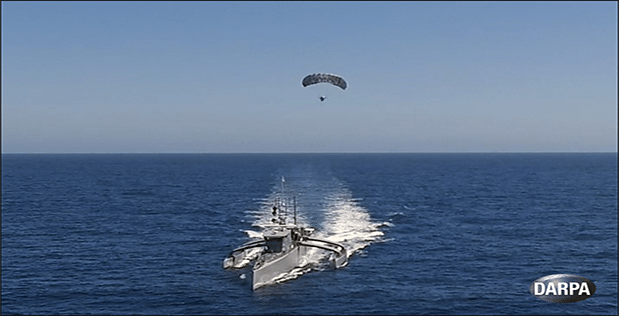Maritime Industry Legend Jim Lawrence Dies
Jim Lawrence, a towering figure in U.S. maritime industry and founder of the Connecticut Maritime Association (CMA) conference, passed away on Sunday after a short illness. Lawrence, who established and...

, is the naval equivalent of Google’s self-driving car, designed to cruise on the ocean’s surface for two or three months at a time – without a crew or anyone controlling it remotely.
The Pentagon’s new unmanned submarine chaser is currently undergoing at-sea testing off the coast of California and recently set sail with its first-ever payload: some sort of super high-tech (probably) parasail.
The prototype vessel, known as Anti-Submarine Warfare (ASW) Continuous Trail Unmanned Vessel (ACTUV) or Sea Hunter for short, is built to track enemy submarines over thousands of miles of ocean for months at a time and without a single crew member on board.
In the video below, the ACTUV is actually testing its Towed Airborne Lift of Naval Systems (TALONS) system, which could be towed behind boats or ships carry out intelligence, surveillance, reconnaissance (ISR), and communications ops by extending the equipment range compare to a ship’s mast.
The vessel is built by DARPA, an advanced research agency under the Department of Defense, together with the U.S. Navy.
“The demonstration took place over two days with 90 minutes of flight each day. The TALONS prototype started out from its “nest” installed on the back of the ACTUV vehicle. It then expanded its parachute and rose to an altitude of 1,000 feet, where it tested its onboard sensors and communications equipment. Once the test was complete, the prototype reeled itself in back to the nest. The entire process took place as the ACTUV vehicle maneuvered at operationally realistic speeds,” DARPA said in a statement.
DARPA signed a Memorandum of Agreement (MOA) with the Office of Naval Research in September 2014 to jointly fund an extended test phase of an ACTUV prototype. The vessel was christened in 2016 in Portland, Oregon. Pending the results of those tests, the program could transition to the Navy by 2018.

Sign up for gCaptain’s newsletter and never miss an update

Subscribe to gCaptain Daily and stay informed with the latest global maritime and offshore news


Stay informed with the latest maritime and offshore news, delivered daily straight to your inbox
Essential news coupled with the finest maritime content sourced from across the globe.
Sign Up